Consider the Source, Pt. 1
Who We Listen to is Who We Become
What Just Happened?
I glance back at a recent event and relay some thoughts.
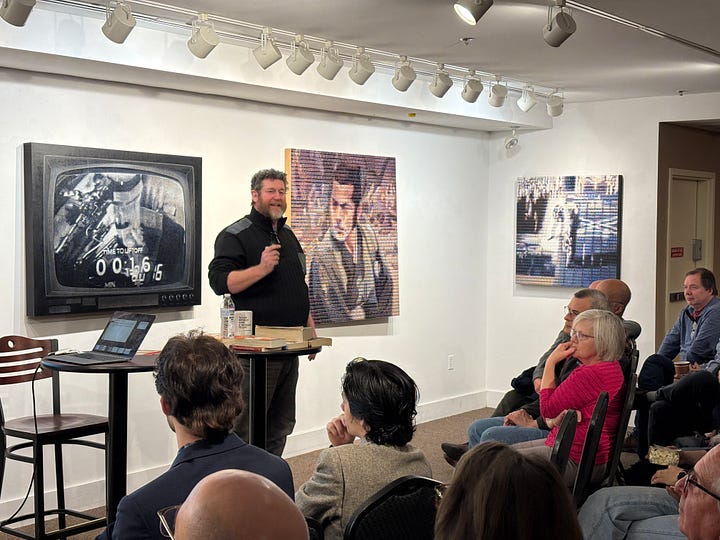
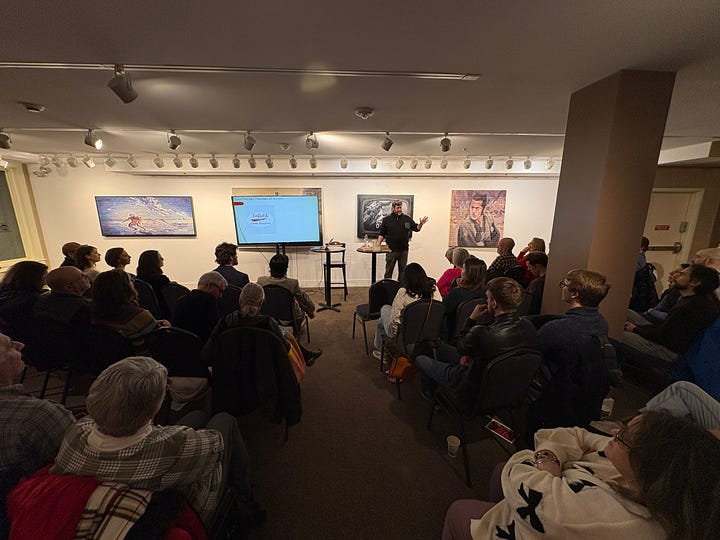
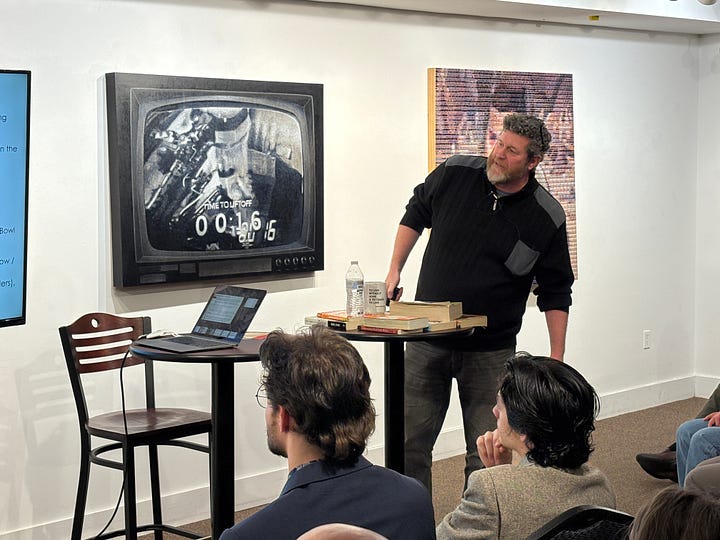
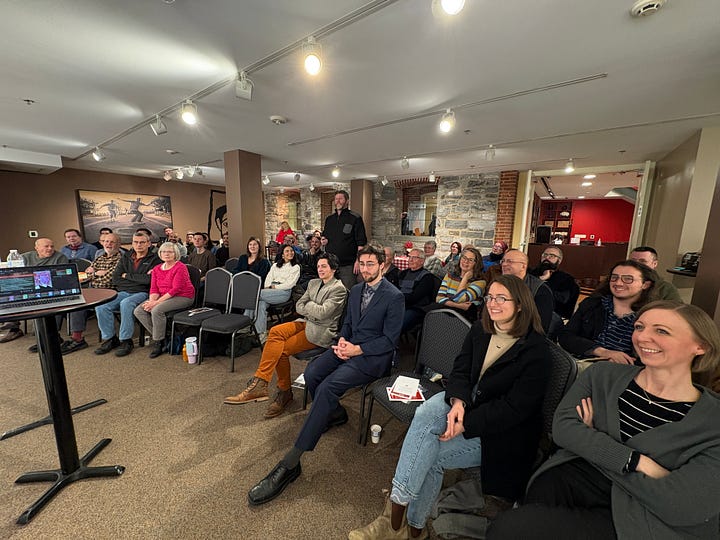
The idiom “consider the source” is typically negative. Like when someone in a trash-strewn minivan is recommending the latest snake oil treatment. We consider the source and politely decline. We also cynically dismiss our neighbors’ ideas gleaned from news outlets that don’t align with our preferences.
Where’d you hear that? Fox News? OMG, do you actually listen to NPR? Consider the source!
Of course part of this is reasonable. All ideas, convictions, and actions can be traced back to a source, that is a philosophy, person, or commitment.
What happens when someone tells you there’s a book so insightful that it just might be THE book of our times? You might want to hear what this person has to say about it. Or you may not want to, considering the source. You might also chose to read it for yourself.
The source of our provocative Forum on Valentines Day was Bruce Etter, a thirty year veteran literature instructor. He’s a pretty trusted guide, I’d say.
His summary of Infinite Jest definitely provoked an array of responses. Some, like me, walked away grateful for Etter’s heavy lifting. Not only is he able to lift the hefty 1,300 page volume above his head, he’s also read it. I’d say most of us likely won’t read it, thank you, due to its rather disturbing content, but some have and will.
You can let Bruce be your guide by listening to his Forum now. I’d love your thoughts.
We all felt his teacher’s passion and engaging wit. He clearly appreciated the book and implicitly endorsed it as a book for our times, recognizing it’s not everyone’s cup of tea.
The really expansive and important concerns were voiced toward the end of the night, and we all felt like we just needed more time to answer a couple of honest questions:
What’s the point of reading it, especially if it could trigger ugly images or awake horrible memories?
What good is it for a Christian?
Bruce, being the consummate teacher, held back from preaching points but defended the reading of such literature as a way to love our neighbors by being aware of what they value.
Alas, he couldn’t do it all, and a lot more could be discussed.
As Bruce is able, we’ll hold a follow-up discussion once March is over (we’re collaborating on two events; see below). It’s the sort of debriefing we’re planning to introduce into the regular rhythms of The Row House, Inc. So, stay tuned.
In the meantime please sign into Substack, make your own log-in, and share your own thoughts below about Bruce’s talk or anything else. I’ll be happy to chime in with my two cents. Let’s keep the conversation going.
Tomsées
In which I share a short take on Christ and culture.*
I got questions you can’t answer
Your got answers I can’t question
-Say She She, from the album Silver, 2023
I’m intrigued by cult practices and the stories of those who’ve escaped their nets. A cult constant is coercive leadership. Be it classic cults like the Moonies, human potential schemes, or even fundamentalist “Christian” groups, there’s always a definite sense that you can’t ask certain questions. Why? Because only the leaders have all the answers.
The reality is coercive and self-centered leaders simply don’t have good answers for honest questions from inquisitive people.
Typically the source of a cult is one living or deceased, galvanizing individual. This person binds a spell over the whole lot using fear and manipulation, usually after a season of binding affection within a collective of folks looking for answers to life’s persistent questions.
These leaders usually claim to be enlightened, special recipients of revelation.
For instance, without Mary Baker Eddy’s teachings, the whole Christian Science movement collapses. Same goes for Keith Raniere’s Nexium course, David Koresh’s claim to be God’s voice in the last days, and the list goes on, sadly, without end.
The Mormon church seems like a mainstream denomination these days, but its roots share a similar individualized source.
Last fall a couple of Mormon guys came walking up College Avenue and looked up at me from the sidewalk. They were looking for eye contact.
Though I usually duck and run indoors at the sight of the short haircuts, white shirts, and black ties, this time I smiled and boldly declared: “I’m a Christian, guys, so I’m not interested in your faith. And I’m busy on a house project (which I was), so I’ll tell you what. Give me your number, and we’ll have a good sit-down.”
What was I thinking? Not much besides a typical “fight” response, I guess. Then I realized I painted myself into a corner! I stepped down to get a phone number.
I asked for their names. “I’m Elder so-and-so, and this is Elder…” To this I cut the lead guy off and asked for their first names. My attempt to establish equality was an affront to their training, though. He stumbled. “Uh, well, I’m Ryan and this is Aaron, but we prefer to go by our titles.”
I was a little rude, I admit.
I took Ryan’s number, and much to his surprise, I called. We arranged an hour to meet. They came to my back garden and we sat around my fire ring drinking ice water and chatting.
My agenda was to listen to their best pitch. I didn’t let on that I’d studied Mormonism loosely over the years or that I’d been to seminary and run a Christian public theology outreach.
I truly wanted to know what the point would be of someone like me joining the LDS church. I’m a convinced Christian in the historic orthodox sense, I like to believe, and my church is a wonderful means of grace. I have more than enough in Jesus and his people.
Elders Ahead of Their time
The LDS church throws these kids into the streets not because they’re effective at winning people over but to galvanize their own fledgling commitment to the church. It seems to work. I felt sorry for them, but I remained curious.
Their appeal to me had to do with “a closer relationship with God” through their brand of worship, rituals, and works. I asked about their source, the very history of the Joseph Smith’s teachings. They only had platitudes for answers, procedural bullet points they couldn’t divert from: All the stuff about Jesus visiting native Americans and Mr. Smith receiving a revelation from the angel Moroni.
No surprises. It wasn’t my first Salt Lake rodeo.
Mr. Smith’s revelation is propagated to this day with no corroborating evidence or contemporary testimony. It’s a mystical history they are expected to receive without question and attested to by one man alone.
I wasn’t sold, and they could see it. I apologized for being rude to them weeks earlier and thanked them for their time. As the end of our hour commenced they remarked that they’d never been hosted in this way, and they thanked me.
Things were going off-script. Then something marvelous happened.
As we stood up I broke with the religious talk and asked, “How’s the BYU football team doing?” Predictably these Gen Z bros’ faces lit up! I got an earful about the season, their quarterback, and other details I had no reference point for.
As we walked to the front sidewalk, I mentioned my beleaguered devotion to the Sixers, and we stayed on the sports talk for a few, glorious upbeat minutes. It’s possible backs were slapped. We said our goodbyes, and in that moment were on the same team. The human team.
It’s a Lot to Ask
At some point in our more serious conversation, I just had to tell them: Look, I believe in God, the Christian god as you claim to. But it’s a lot to ask to swallow the LDS teaching. I got blank stares from that comment.
In my next installment I want to talk more directly about the role attestation plays in any brand of faith. What we find in the Jewish understanding of religion up through the Christian era was not only unique back then, it remains a most compelling defense for something to believe in, solely based on the kind of attestation it’s based on. I plan to dig into that.
*Tomsées is a nod to Pensées, an eclectic collection of writings by Blaise Pascal which were a work of apologetics for the Christian faith, published posthumously in 1670.
Let’s Talk About the Future
The 4-1-1 on What’s Coming Down the Pike at The Row House, Inc.
Square Halo Books Conference, 7-8 March ‘25
Once again The Row House will participate in this wonderful, collaborative, and fun-filled conference full of food, art, music, and talks. There are three ways we’re contributing:
On Friday at 3:30 yours truly is speaking on What am I Doing with this One Wild & Precious Life? Managing vocational dysphoria with God’s help.
As the promo says
Pulling from his own story recounted in the introduction to Good Posture (Square Halo, 2017), Tom reflects on work, calling, and identity. Less a lecture and more like a group help session, he wants to hear some of your stories. What are your wanderings and wonderings about vocation? How does following King Jesus make a difference in our sense of calling? What steps can we take to achieve that elusive vocational ideal where "our deep gladness and the world's deep hunger meet?” (Frederick Buechner).
That evening we are co-hosting the plenary speaker, Diana Glyer, a ceramics artist, author, and lecturer. We have 50 seats available for any of you to grab. Her talk is called Lost & Found: Clay in the Potter’s Hands in which she’ll offer observations about clay, grog, wheels, wedging, and the way God works miracles in our ordinary, everyday lives. Act soon!
$12.50 in advance only | Sponsors & Members plus one free with reservation
On Saturday evening we’re also co-sponsoring a concert featuring Skye Peterson & Thomas Austin. To partake in that event you’ll need to sign up for the full Saturday ticket.
Forum with Kaitlyn Scheiss, Saturday 15 March ‘25, 9:00-10:30 AM at WestArt
We’re honored to partner with The Good Neighbor Project of Lancaster to hear from a theologian and culture commentator who’s making waves with her podcast Curiously Kaitlyn and regular contributions on The Holy Post.
Her talk For the Life of the World: Spiritual Formation for Our Common Life is based on her two recent books on faith and faithful political engagement.
Warning: Kaitlyn is really into a particular political party called The Kingdom of Jesus. If this intrigues you, you won’t be disappointed. Bring your friends, questions, and ideas.
Well, that’s about all for now. Please stay in touch, and don’t forget to ❤️ this column on Substack, make a comment, or reach out to me with anything on your mind. See you soon!
Here Comes Spring,
Tom Becker, Founder & Curator of The Row House Forum


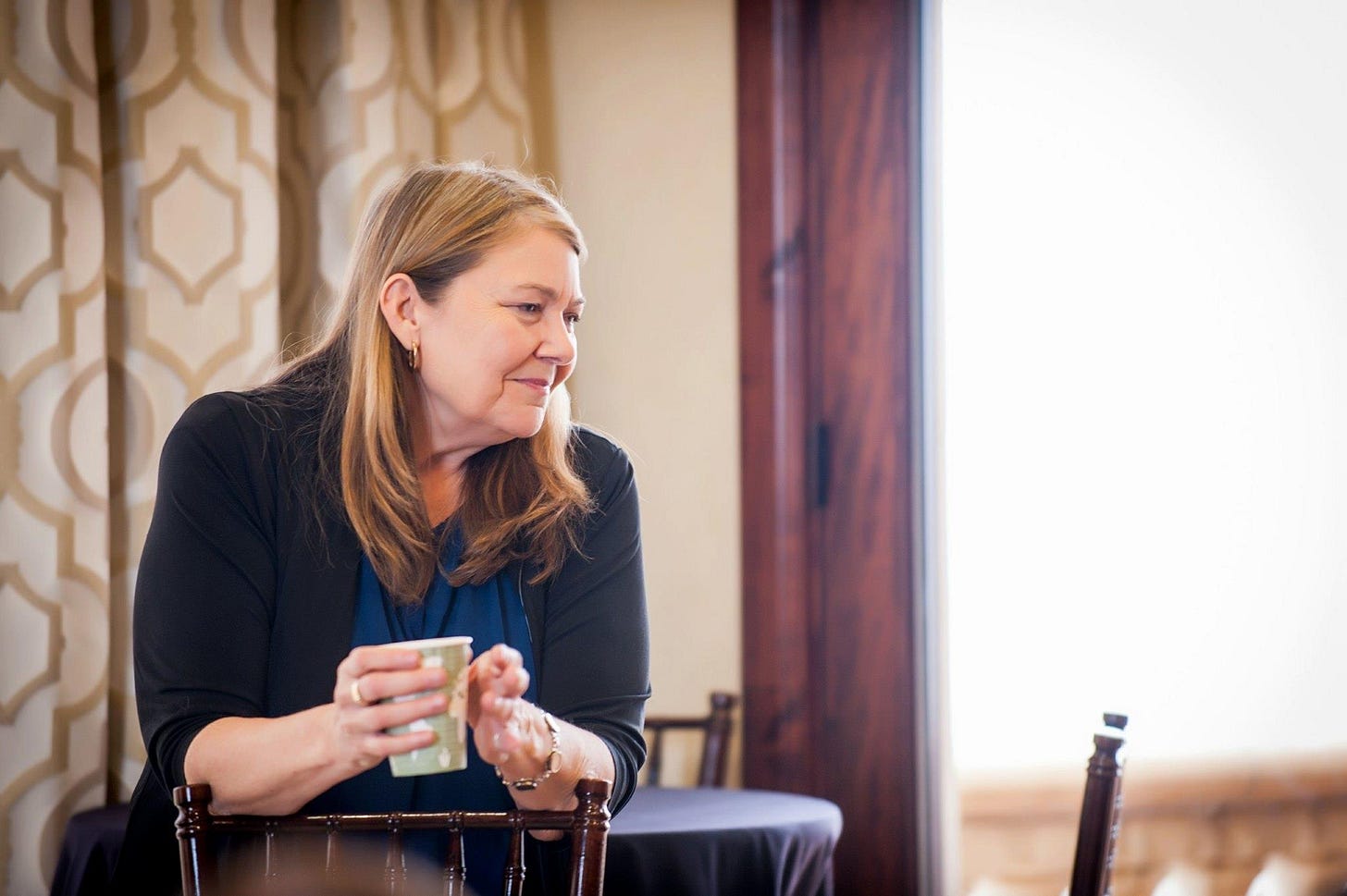


I listened to Bruce's talk a few days ago and am looking forward to a debriefing! There is so much to take from DFW's work.
I loved this talk and would love to hear more from this speaker on DFW and IJ (and wanted to email him to get the slides but wasn't sure how). Many books that are considered classics have themes and ideas that are provocative and, due to human nature, ugly. Everything I have read by DFW has struck me as prophetic (in some sense of the word) and I think if we take a look at Ezekiel, we have to admit that the Christian scriptures contain so pretty graphic and ugly prophetic messages. So while I don't claim that his works are “must read” for anyone, I don’t think that Christians should avoid him in particular because of distasteful content. He isn’t gratuitous with his ugliness, he’s showing us something true and holding up a mirror can be unsettling, especially in a culture so used to “filtered” images of ourselves.